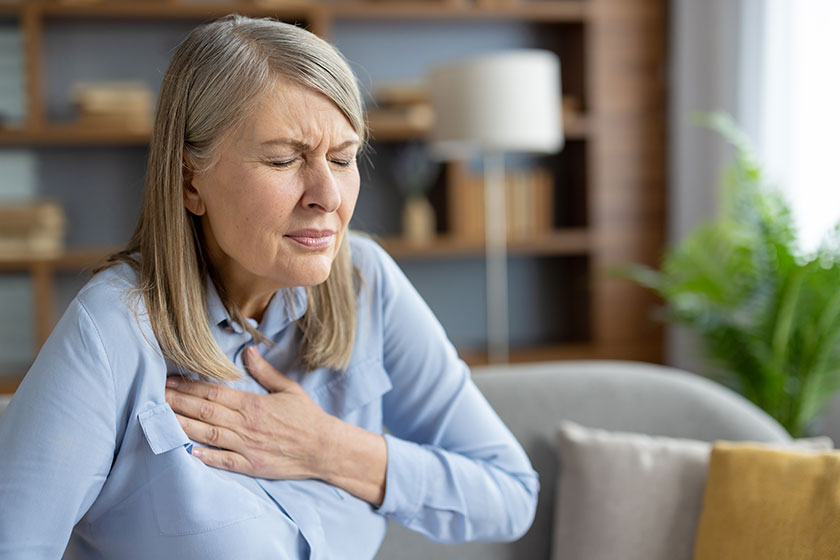Heart disease is a leading cause of health complications among older adults, and recognizing its early signs is crucial for effective management and treatment. Understanding how to spot symptoms of heart disease in seniors can help you and your loved ones seek timely medical care, potentially preventing severe outcomes. Here’s what you need to know about identifying the warning signs of heart disease in seniors.
Understanding Heart Disease in Seniors
Heart disease encompasses various conditions that affect the heart’s structure and function. It includes coronary artery disease, heart failure, arrhythmias and more. Residents are particularly vulnerable due to age-related changes in the heart and blood vessels, making it essential to understand the risks and symptoms associated with heart disease in this population.
Common Symptoms of Heart Disease
Recognizing the common symptoms of heart disease in seniors is the first step in early detection and intervention. These symptoms can vary widely but often include:
● Chest Pain or Discomfort
One of the most recognizable signs of heart disease is chest pain, often described as a feeling of pressure, tightness or heaviness. This discomfort may radiate to the shoulders, necks or arms. While chest pain can be indicative of other conditions, it is a significant warning sign of coronary artery disease or a heart attack and should not be ignored.
● Shortness of Breath
Those with heart disease often experience shortness of breath, especially during physical activity or while lying down. This symptom can indicate heart failure or other cardiac issues. It occurs when the heart struggles to pump blood efficiently, causing fluid to accumulate in the lungs.
● Fatigue and Weakness
Persistent fatigue and weakness can be subtle signs of heart disease. Residents may find everyday tasks exhausting and may experience a general sense of tiredness. This occurs when the heart cannot pump enough blood to meet the body’s needs, leading to decreased energy levels.
● Swelling in the Legs, Ankles and Feet
Edema, or swelling in the lower extremities, is a common symptom of heart disease in seniors. It results from the heart’s inability to pump blood effectively, causing fluid to build up in the tissues. This can lead to noticeable swelling, particularly after periods of sitting or standing.
● Irregular Heartbeat
An irregular heartbeat, or arrhythmia, can be a sign of heart disease. Individuals may feel palpitations, fluttering or an unusually slow or fast heartbeat. While some arrhythmias are harmless, others can indicate more serious heart conditions that require medical attention.
● Dizziness or Lightheadedness
Dizziness or lightheadedness can occur when the heart fails to pump blood adequately, leading to reduced blood flow to the brain. Residents experiencing these symptoms should seek medical evaluation, as they can increase the risk of falls and other complications.
Less Common Symptoms to Watch For
In addition to the more typical symptoms, there are less common signs of heart disease that residents and their caregivers should be aware of:
● Nausea and Vomiting
Heart disease can sometimes manifest as nausea, vomiting or indigestion, particularly in women. These symptoms are often overlooked or mistaken for gastrointestinal issues, but they can signal an underlying heart problem.
● Persistent Cough or Wheezing
A persistent cough or wheezing, especially if it produces white or pink blood-tinged mucus, can be a sign of heart failure. This occurs when fluid accumulates in the lungs due to the heart’s reduced pumping capacity.
● Sudden Sweating or Cold Clammy Skin
Unexplained sweating or cold, clammy skin can be a symptom of a heart attack or severe heart disease. It often accompanies other symptoms like chest pain and should be treated as a medical emergency.
When to Seek Medical Help
It is crucial to seek medical help if any of these symptoms are present. Early detection and treatment of heart disease can improve outcomes and quality of life for residents. While prevention is key, regular check-ups, monitoring of blood pressure and cholesterol levels and a healthy lifestyle are vital in managing heart disease risks.
How We Can Help
At our Assisted Living community, we prioritize the heart health of our residents by providing regular health screenings, personalized care plans and a supportive environment that promotes a heart-healthy lifestyle. Our dedicated team works closely with residents to monitor their health and manage risk factors effectively. Visit us today to learn more about how we can help you and your loved ones maintain a healthy and fulfilling life.







